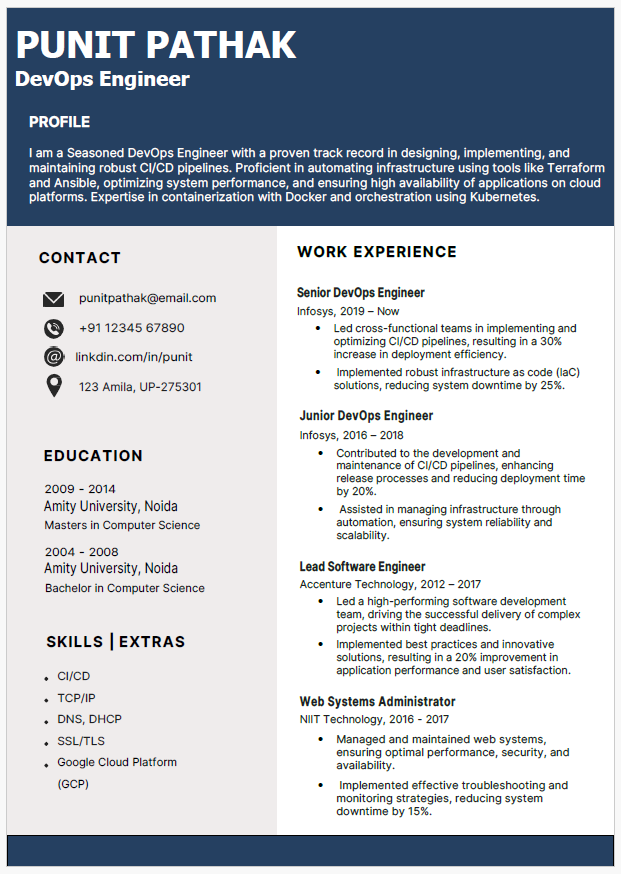DevOps Engineer
Masters in Computer Science

About this template
This is a very professional resume which can significantly enhance your job prospects.
With its clean, modern design and industry-tailored layout, it highlights your skills and achievements, making a strong impression on recruiters.
Some most common and important interview questions for DevOps Engineer
Here are some of the most common and important interview questions for a DevOps Engineer, along with brief answers that highlight key skills:
1. How do you implement CI/CD pipelines in your projects?
Implementing CI/CD pipelines involves automating the build, test, and deployment processes using tools like Jenkins, GitLab CI, or CircleCI. My experience includes setting up pipelines that ensure code is continuously integrated and deployed with minimal manual intervention, enhancing development efficiency.
2. Can you describe your experience with containerization and orchestration?
Containerization using Docker and orchestration with Kubernetes are critical in managing microservices and ensuring scalability. I have hands-on experience in deploying applications in containers, managing clusters, and automating scaling processes, ensuring consistent and efficient deployments.
3. How do you manage infrastructure as code (IaC)?
Managing infrastructure as code involves using tools like Terraform or Ansible to automate the provisioning and configuration of infrastructure. My skills in IaC allow me to create reproducible, version-controlled environments, reducing manual errors and speeding up deployments.
4. What is your approach to monitoring and logging in a production environment?
Monitoring and logging are crucial for maintaining system health and performance. I use tools like Prometheus, Grafana, and the ELK Stack to monitor system metrics, log errors, and set up alerts. This proactive approach helps in quickly identifying and resolving issues.
5. How do you ensure security in your DevOps processes?
Security in DevOps, often referred to as DevSecOps, is about integrating security practices throughout the CI/CD pipeline. I focus on automating security tests, managing access controls, and ensuring compliance with security standards, thereby minimizing vulnerabilities.
6. Describe your experience with cloud platforms like AWS, Azure, or Google Cloud.
Cloud platforms are integral to modern DevOps practices. I have extensive experience in deploying and managing applications on AWS, using services like EC2, S3, and RDS, and configuring infrastructure with tools like CloudFormation or Terraform to ensure scalability and reliability.
7. How do you handle version control and collaboration in a team environment?
Version control is managed using Git, where I ensure that all team members can collaborate seamlessly through branching strategies, pull requests, and code reviews. This helps maintain code integrity and facilitates smooth integration of new features.
8. What scripting languages are you proficient in, and how do you use them in your DevOps work?
Scripting languages like Python, Bash, and PowerShell are essential for automating repetitive tasks and managing infrastructure. I use these languages to write scripts that automate deployment processes, manage servers, and integrate various tools in the DevOps toolchain.
9. How do you approach troubleshooting in a production environment?
Troubleshooting in production requires quick and effective problem-solving. I use logging and monitoring tools to identify issues, along with my deep understanding of system architecture and network protocols, to diagnose and fix problems efficiently without causing downtime.
10. Can you discuss a challenging project you worked on and how you implemented DevOps practices to overcome obstacles?
One challenging project involved migrating a monolithic application to a microservices architecture. I implemented DevOps practices like CI/CD pipelines, containerization with Docker, and automated testing to ensure a smooth transition. My ability to coordinate between teams and automate processes was key to overcoming obstacles and delivering the project successfully.
Conclusion:
These questions and skills are critical for assessing a DevOps Engineer's ability to manage the complexities of modern software development and deployment, ensuring efficient, secure, and scalable systems.